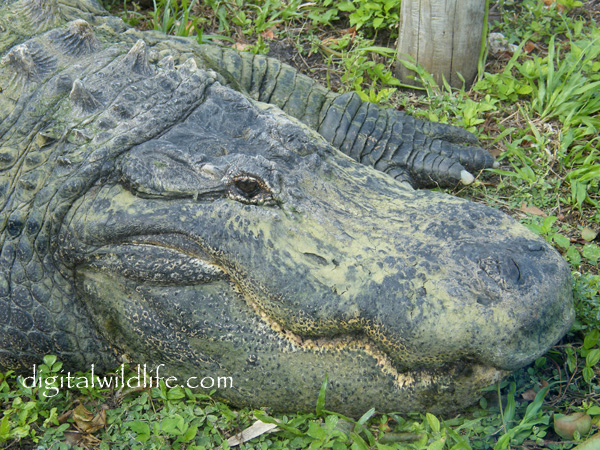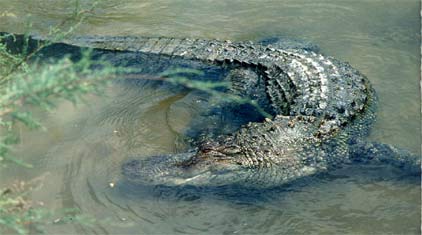
+- WildFact (https://wildfact.com/forum)
+-- Forum: Information Section (https://wildfact.com/forum/forum-information-section)
+--- Forum: Terrestrial Wild Animals (https://wildfact.com/forum/forum-terrestrial-wild-animals)
+---- Forum: Reptiles and Birds (https://wildfact.com/forum/forum-reptiles-and-birds)
+---- Thread: Alligators (Alligator sp.) (/topic-alligators-alligator-sp)
RE: Alligators - Paleosuchus - 02-18-2017
Some cool photos, including impressive specimens

*This image is copyright of its original author

*This image is copyright of its original author

*This image is copyright of its original author

*This image is copyright of its original author

*This image is copyright of its original author

*This image is copyright of its original author
Look at this one's head!

*This image is copyright of its original author

*This image is copyright of its original author

*This image is copyright of its original author

*This image is copyright of its original author

*This image is copyright of its original author

*This image is copyright of its original author

*This image is copyright of its original author
RE: Alligators - Paleosuchus - 02-21-2017
Two instances of orange alligators have cropped up lately, likely the result of foraging and laying in sediments.
Orange Hued Alligator Spotted in South Carolina

*This image is copyright of its original author
An orange alligator suns itself on the banks of a retention pond at the Tanner Plantation neighborhood on Thursday, Feb. 9, 2017 in Hanahan, S.C.
A predatory beast with leathery orange skin is gallivanting through social media, sowing fear in its wake.
That's because there have been recent sightings of a tangerine-colored alligator in South Carolina.
Earlier this week, members of a residential community in Hanahan, South Carolina, spotted an unusual sight near one of the retention ponds — an alligator with skin tinted an orange hue. Estimated to be 4 to 5 feet (1.2 to 1.5 meters) long, the apricot alligator was nicknamed "Trumpigator" by its human neighbors, local television newscast WCBD News 2 reported.
The carrot-colored crocodilian is most likely an American alligator (Alligator mississippiensis) — the only crocodilian native to South Carolina — which can live to be more than 60 years old and reach lengths of up to 13 feet (4 m), according to the South Carolina Department of Natural Resources (SCDNR).
Earlier this week, the gator was photographed basking on the bank near a pond, its bright orange skin standing out in sharp contrast to the patchy brown grass. Several Facebook commenters joked that the alligator must be a fan of the Tigers football team at Clemson University, South Carolina, which has an orange logo and uniforms.
But alligators don't paint themselves in pumpkin palettes to show sports allegiances or to look tanned for television cameras. So what might have turned this alligator the unexpected hue? One explanation might be rust, iron oxide, from a steel culvert where the alligator was hiding out during the winter, an SCDNR representative tweeted.
An environmental factor like algae or a pollutant in the water could also color a gator's skin, but it's difficult to know for sure, Josh Zalabak, a herpetologist with the South Carolina Aquarium, told WCBD News 2. If the discoloration is only skin-deep, it should disappear in a few weeks, when the alligator sheds its skin, WCBD News 2 reported.
While rusty reptiles are rare, this isn't the first time someone has spied an alligator resembling an escapee from a Cheetos factory.
In 2011, news of an orange alligator photographed in Venice, Florida, prompted speculation about whether the beast's appearance represented a dramatic dye job or "evolution in action," biologist David Steen wrote in a blog post that year.
Steen, an assistant research professor at the Auburn University Museum of Natural History in Alabama, noted that the Florida Fish and Wildlife Conservation Commission weighed in quickly to explain that the peculiar color was probably caused by something in the water. In fact, Steen had observed this phenomenon firsthand, in turtles he captured years earlier in New York State, he said.
"I would occasionally visit ponds with water stained from naturally occurring sediment. As you might expect, the turtles I caught in these ponds were colored differently from those I caught elsewhere," Steen wrote.
As tempting as it might be to venture closer to a strangely colored gator to snap a photo, wildlife officials warn that people need to exercise caution around these large predators, and maintain a safe distance. About 60 feet (18 m) is recommended by the Savannah River Ecology Lab (SREL) at the University of Georgia, in a post about alligator safety.
"Please remember that they are wild animals and should be respected as such," J. Whitfield Gibbons, director of outreach for SREL, said in the statement. "A few precautions on our part can help both humans and alligators coexist safely."
http://www.livescience.com/57845-orange-alligator-in-south-carolina.html

*This image is copyright of its original author
" For the second time this month, a rust-colored alligator has turned up in the Carolinas.
The Sun News of Myrtle Beach reports (http://bit.ly/2mhVXP1 ) Tuesday that some residents of a Calabash, North Carolina, neighborhood have named the pumpkin-colored alligator "Donny."
Earlier this month, residents joked that an orange alligator that turned up in a pond near Charleston had used too much self-tanning lotion. Jay Butfiloski with the South Carolina Department of Natural Resources said the color may have come from where the animal spent the winter, perhaps in a rusty steel culvert pipe."
http://www.witn.com/content/news/2nd-orange-alligator-pops-up-on-the-Carolina-coast-414354233.html
RE: Alligators - Sully - 07-20-2017
A photo circulating in the media this week of an alligator lurking in the shallow waters of Florida’s Myakka River State Park invites us to reflect on the hypnotic power of eyes in art. Taken in the quarter-light of darkest dusk, just as the semi-aquatic reptile is either lifting its head above or lowering its nostrils below the water’s surface, the photo is poised precariously between physical and psychological states of existence: air and water, waking and dream.

*This image is copyright of its original author
RE: Alligators - epaiva - 09-28-2017
Credits to @page_z @buckmcneely and @aquadariums

*This image is copyright of its original author

*This image is copyright of its original author

*This image is copyright of its original author
RE: Alligators (Alligator sp.) - Shadow - 06-01-2019
A different kind of guest in the middle of the night...
https://www.orlandoweekly.com/Blogs/archives/2019/05/31/an-11-foot-alligator-was-found-inside-a-clearwater-home-last-night
RE: Alligators (Alligator sp.) - johnny rex - 06-01-2019
(02-18-2017, 12:30 AM)Paleosuchus Wrote: Some cool photos, including impressive specimens
*This image is copyright of its original author
*This image is copyright of its original author
*This image is copyright of its original author
*This image is copyright of its original author
*This image is copyright of its original author
*This image is copyright of its original author
Look at this one's head!
*This image is copyright of its original author
*This image is copyright of its original author
*This image is copyright of its original author
*This image is copyright of its original author
*This image is copyright of its original author
*This image is copyright of its original author
*This image is copyright of its original author
The 7th pic must be a captive specimen, I think. Captive gators tend to have broader snout compared to their wild counterparts.
RE: Alligators (Alligator sp.) - Sully - 06-15-2019

*This image is copyright of its original author
RE: Alligators (Alligator sp.) - Shadow - 07-21-2019
Alligator eating a python in Florida, february 2019.
RE: Alligators (Alligator sp.) - Spalea - 08-26-2019
A very big alligator... I don't know what I would do if I crossed such an animal. I would intensively look at it, but I don't believe I would photograph it with my iphone.
RE: Alligators (Alligator sp.) - BorneanTiger - 08-27-2019
(08-26-2019, 01:11 AM)Spalea Wrote: A very big alligator... I don't know what I would do if I crossed such an animal. I would intensively look at it, but I don't believe I would photograph it with my iphone.
How about tee(th) for 2?
RE: Alligators (Alligator sp.) - Spalea - 08-28-2019
@BorneanTiger :
About #25: these two alligators, "the yours" and "the mine" have a kind of goitre... Would it be a distinguished feature in relation to the true crocs ?
Otherwise I know that, as concerns the crocs, the fourth tooth of the lower jaw must be a prominent one...
RE: Alligators (Alligator sp.) - BorneanTiger - 08-29-2019
(08-28-2019, 01:12 AM)Spalea Wrote: @BorneanTiger :
About #25: these two alligators, "the yours" and "the mine" have a kind of goitre... Would it be a distinguished feature in relation to the true crocs ?
Otherwise I know that, as concerns the crocs, the fourth tooth of the lower jaw must be a prominent one...
I don't think that the goitre is unique to alligators: https://books.google.com/books?id=4Arv-IUFnuoC&pg=PA278&lpg=PA278&dq=crocodile+goitre&source=bl&ots=eU5s9uiwlc&sig=ACfU3U2ufQDshKYmPGA0QfAJz7ReiXrQjQ&hl=en&sa=X&ved=2ahUKEwjexMCjuajkAhXOQEEAHfMVD8wQ6AEwAXoECAkQAQ#v=onepage&q=crocodile%20goitre&f=false
RE: Alligators (Alligator sp.) - Spalea - 09-16-2019
Alligators don't get each other litle gifts...
RE: Alligators (Alligator sp.) - BorneanTiger - 09-18-2019
(09-16-2019, 09:49 AM)Spalea Wrote: Alligators don't get each other litle gifts...
Cannibalism?
RE: Alligators (Alligator sp.) - Spalea - 09-18-2019
@BorneanTiger :
About #29: " Cannibalism? "... Possible. I believe the killer is clearly much bigger than its victim to speak about rivalry.